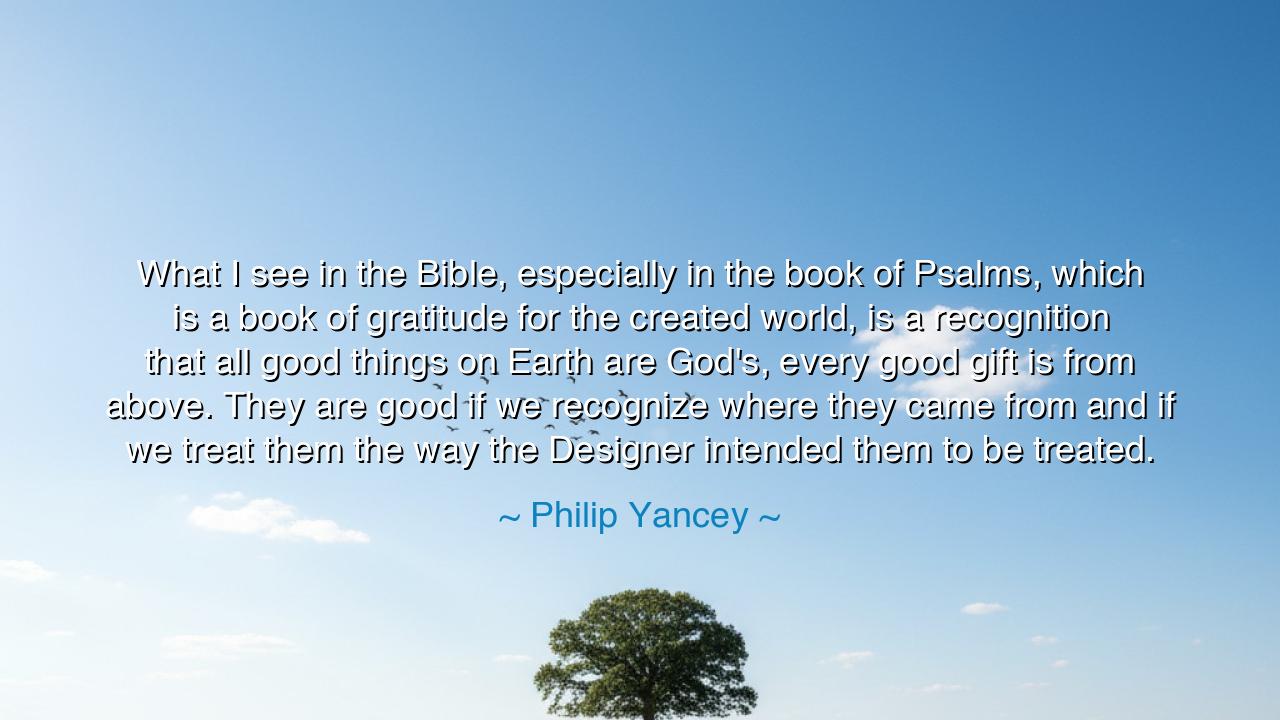
What I see in the Bible, especially in the book of Psalms, which
What I see in the Bible, especially in the book of Psalms, which is a book of gratitude for the created world, is a recognition that all good things on Earth are God's, every good gift is from above. They are good if we recognize where they came from and if we treat them the way the Designer intended them to be treated.






“What I see in the Bible, especially in the book of Psalms, which is a book of gratitude for the created world, is a recognition that all good things on Earth are God's, every good gift is from above. They are good if we recognize where they came from and if we treat them the way the Designer intended them to be treated.” — Philip Yancey speaks these words with the heart of one who has deeply understood the sacredness of creation. They are not simply a reflection on gratitude, but an invitation to look upon the world with reverence and to live in harmony with the Creator’s will. Yancey directs us to the Psalms, those ancient songs of praise, as a mirror to our own lives, reminding us that all good things — from the smallest blade of grass to the vast oceans — are gifts from God, meant to be cherished and used with honor.
The Psalms, written by the ancient psalmists who walked in awe of the natural world, are not just songs of praise for God's greatness, but for His ongoing creation. The psalmist recognizes the beauty of the world as not an accident of nature, but a manifestation of divine design. In every sunrise, every river, every mountain, there is the unmistakable fingerprint of God. And in recognizing this, the psalmist lifts his heart in gratitude. This was the ancient wisdom: to understand that all good things come from the hand of the Divine is to live with an awareness that every gift is a sacred trust, meant to be cared for and respected. The ancient Israelites saw creation itself as holy, and they treated it with deep reverence, as a reflection of God's presence on Earth.
When Philip Yancey speaks of the created world and our responsibility to it, he echoes the very words of the ancients, who recognized that creation is not ours to abuse but ours to steward. The book of Genesis begins with God placing man in the garden of Eden not to dominate it, but to tend it, to care for it, to be a steward of God's good creation. When the first humans fell from grace, it was not just a matter of disobedience but a disrespect for the gifts they were given. They misused the abundance of Eden, and in doing so, the balance of creation was broken. In this fall, we learn that the gifts of the world, whether it be the earth, the waters, or even our fellow human beings, are not ours to exploit, but to respect and honor.
Consider the life of Saint Francis of Assisi, a man who saw the world through the eyes of deep gratitude. Saint Francis lived a life of profound simplicity and reverence for nature. He is often depicted preaching to the birds, speaking to the animals, and honoring the earth as a sacred gift. To him, every creation was a brother or sister, and the world was a divine reflection of God's love. He saw no distinction between the sacred and the secular, for in every creature and every plant, he saw the hand of the Creator. His life reminds us of the truth in Yancey’s words: that when we recognize where the gifts of this world come from, we begin to treat them as they were meant to be treated — with love, gratitude, and respect.
The lesson here is profound, for it calls us to a deeper awareness in our everyday lives. How often do we take the good things in life for granted? How often do we forget that the very breath we take, the food we eat, the relationships we cherish, are gifts from above? The ancients understood that in every moment of life, we are either honoring the Creator or dishonoring the gifts He has given us. In this, we see that gratitude is not a passive feeling, but an active way of living. It is a way of life that requires us to recognize the sacredness of all creation and to live in harmony with the Divine will.
The practical action we must take, then, is to cultivate a life of gratitude. In every moment, let us pause and recognize the source of our blessings. Let us not simply use the world and its gifts, but treat them as sacred, with deep respect and care. Whether it is the earth beneath our feet, the food on our table, or the love we receive from others, we must honor them as the gifts they are. Reverence for the created world is a path to deeper spiritual connection. When we learn to live with gratitude, we align ourselves with the will of the Designer and become better stewards of the gifts He has given us.
Thus, let this wisdom be passed down through the ages: all good things are gifts from God, and when we recognize where they come from, we are called to treat them with respect and gratitude. In doing so, we live in harmony with the Creator and fulfill our sacred purpose. Every step we take, every action we perform, becomes an offering to the Divine — a blessing returned in kind. When we live in this way, we honor the gifts of the world, and in turn, we honor the One who gave them.






AAdministratorAdministrator
Welcome, honored guests. Please leave a comment, we will respond soon